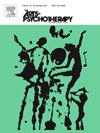Therapeutic factors and mechanisms of change in music therapy for people with late-life depression: A scoping review
IF 1.5
3区 心理学
Q3 PSYCHOLOGY, CLINICAL
引用次数: 0
Abstract
Due to the growing aging population, the number of people with late-life depression (LLD) is estimated to increase significantly. LLD presents symptoms such as persistent low mood, decreased interest and pleasure, and feelings of worthlessness. Music therapy has demonstrated efficacy in alleviating depressive symptoms in this population. However, understanding of its therapeutic factors and mechanisms of change remain limited. This scoping review aims to elucidate the therapeutic factors, mechanisms of change and their related outcomes involved in music therapy for people with LLD. Databases including Medline, Cinahl, Psycinfo, Cochrane, Embase, Web of Science, and Google Scholar were systematically searched. Selection criteria included elderly individuals (above 60), late-life depression, music therapy, therapeutic factors and mechanisms of change. Of 1249 screened studies, 31 were included, identifying 5 domains of presumed therapeutic factors, presumed mechanisms of change and related presumed outcomes. The domains are emotion, social, cognition, arousal and behavior & motivation. The emotion domain, which encompasses presumed therapeutic factors and presumed mechanisms of change for emotion regulation emerged as the most prominent. Both music listening and interactive music making facilitate emotion regulation by evoking and expressing difficult feelings in people with LLD. Insights gained on therapeutic factors and mechanisms of change involved in music therapy for people with LLD can inform strategy development, enhance clinical care, and guide future research efforts.
求助全文
约1分钟内获得全文
求助全文
来源期刊

Arts in Psychotherapy
Multiple-
CiteScore
3.20
自引率
11.10%
发文量
66
期刊介绍:
The Arts in Psychotherapy is a dynamic, contemporary journal publishing evidence-based research, expert opinion, theoretical positions, and case material on a wide range of topics intersecting the fields of mental health and creative arts therapies. It is an international peer-reviewed journal publishing 5 issues annually. Papers are welcomed from researchers and practitioners in the fields of art, dance/movement, drama, music, and poetry psychotherapy, as well as expressive and creative arts therapy, neuroscience, psychiatry, education, allied health, and psychology that aim to engage high level theoretical concepts with the rigor of professional practice. The journal welcomes contributions that present new and emergent knowledge about the role of the arts in healthcare, and engage a critical discourse relevant to an international readership that can inform the development of new services and the refinement of existing policies and practices. There is no restriction on research methods and review papers are welcome. From time to time the journal publishes special issues on topics warranting a distinctive focus relevant to the stated goals and scope of the publication.
 求助内容:
求助内容: 应助结果提醒方式:
应助结果提醒方式:


